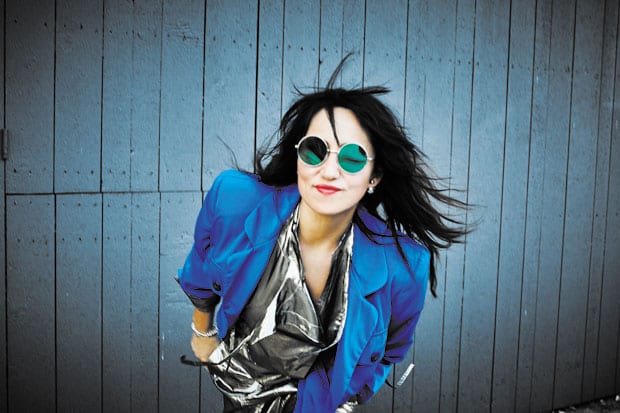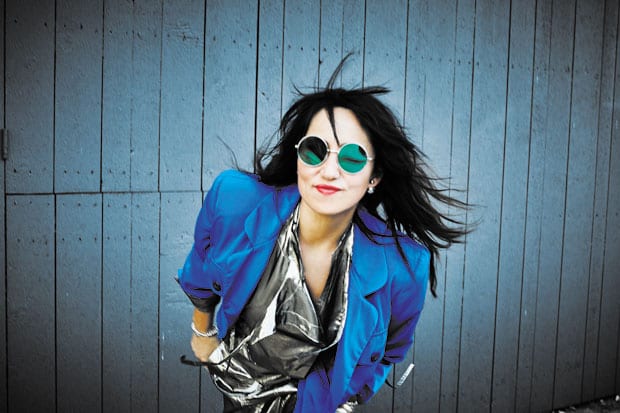Even though she’s not gay herself. Scottish singer KT Tunstall is proud of her LGBT fans — but not so happy Trump used her music at a campaign stop

KT Tunstall says she is hetero, but gender fluid. (Photo by Pamela Littky.
Is she or isn’t she?
Truthfully, KT Tunstall understands the confusion regarding her sexuality — she’s responsible for it, after all. Tunstall, whose breakthrough song, “Suddenly I See,” became every dreamer’s anthem after it was prominently featured in The Devil Wears Prada, opened up about those rumors – and why kissing girls was “a really important part of my formative years” — on the heels of her latest album, KIN.
— Chris Azzopardi
Dallas Voice: How do you explain your big lesbian following? KT Tunstall: Listen, I’ve been super well aware of that from day one and have been so grateful for it.
How did you become aware? From releasing an album where I have fucking rainbow suspenders on! The British album cover for Eye to the Telescope was an homage to Patti Smith’s Horses album, and I loved Mork & Mindy, too, and so we didn’t think about it. It wasn’t me pretending to be gay, but I’m on the front of my album with these bright rainbow suspenders on. All the gay community thought I was gay — and they still think I’m gay! They’re just waiting for me to figure it out.
Have you figured it out? Not yet! [Laughs] Listen, I am absolutely all about no boundaries and no labels. I’m gender fluid.
Is that how you’d describe your sexuality? No, I wouldn’t. I am hetero, but you know, I’ve certainly — I did theater studies at college for Chrissakes; of course I had fun with girls. It was weird in that community not to. And I get the feeling that it’s weird now for people to be kind of hung up about it — certainly in younger people I’ve met, which is such a beautiful shift. There are amazing people spearheading that, like Cara Delevingne, Kristen Stewart and and Eliot Sumner – she’s fucking awesome. It’s not even really an issue [for them], and I’m so glad.
How do those people inspire you? I look at them as someone from the older generation and I just am so relieved that there isn’t as much angst. I feel less angst in this new generation of young people. It feels that there are less and less shackles on young people to adhere to old norms and that inspires me just to be brave in everyday life and to honor how confident and self-assured they are becoming at a much younger age than I did. I feel like I’m keeping up with teenage confidence here.
Tell me about studying theater. I wanted to be an actress when I was younger, so I started in a theater group when I was 8 years old and started performing when I was quite young. By the time I was 15, I went on this really amazing theater course called Scottish Youth Theatre and it was the first time I left home. We were living in a kind of dorm room situation, and it was people who were into all sorts of music that I hadn’t been subjected to. I didn’t go to my first show until I was 15. I grew up at a very sheltered time in Scotland.
What was your introduction to the gay community then? It was during that time when I went to live in Glasgow. I had lived in St. Andrews — very, very straight up academic. When I went over to Glasgow for the theater course, many of the lecturers were gay, and it wasn’t that it was surprising — I wasn’t shocked by it. It was much more that I realized that there was this whole world of life that I hadn’t known about. And there was definitely a very open attitude: If you like this person, then kiss them and that’s completely normal. That’s how fucking life should be, quite frankly. Why on earth would anyone have any problem with someone enjoying themselves? It doesn’t make any sense.
And you were kissing girls then. Would you call that a phase? No; I think it would be disrespectful to call it a phase. It was part of life. It was learning about love and learning about lust and desire and sexuality and becoming an adult and experiencing people. It was a really important part of my formative years.
What’s interesting now is the gender fluidity issue, I think. That’s really exciting and something that I just personally would relate to much more had that been talked about when I was 17, 18. That’s what I would be leaning my ear into because, I mean, when I get on stage something quite masculine happens to me. I think this is also why people have questioned my sexuality. There’s definitely a kind of masculine energy, and I’ve always felt that way and that comes through me when I perform.
I think it’s also playing a guitar! I feel like I have a cock! The guitar is basically like a strap-on. But then it depends how you play it, because I don’t know if Joni Mitchell felt that way. There’s definitely something that happens when I take to the stage, and it’s definitely much more prevalent than when I’m walking around buying eggs in the supermarket.
I read a really great article with Eliot Sumner — Sting’s daughter — and I was quite envious thinking, “Wow, imagine being in my youth and it not really being an issue what gender you are,” because I always felt so tomboy. I grew up with brothers, and when I was younger I always had lots of male friends — mostly male friends. Actually, now, I have mostly female friends, and I think that I’ve kind of inhabited being a woman. I really love my femininity, but I felt like a stranger to it before.
Which track on the album do you think your LGBT fans might enjoy most? Maybe “Hard Girls” because that song is really about being vulnerable and not wearing an entire tub of hair gel on your head and all the makeup in the world and just being you, authentically you and not worrying. That song is totally meant to be a celebration about just fucking not worrying too much about that stuff and letting people get to know you for who you are.
What went through your head the first time you heard “Suddenly I See” in Devil Wears Prada? I was floored! As an artist, having your song used in a movie – you never get the whole song used and you never get your song used without there being dialogue over the top of it. And the whole three-and-a-half minutes of the opening of the movie is just my song, unadulterated! I remember my manager saying to me, “Enjoy this because it’s probably never going to happen again.”
How did you feel about Hillary Clinton using “Suddenly I See” as her 2008 campaign song? It was great. I’m not American, I can’t vote, but I would always want to see the Democrats in power, so I was really happy to be able to contribute in any way to try and make that happen. I don’t know what [a campaign] song would sound like right now — it’s crazy times. I wouldn’t even know where to start. It’s like watching a game show. It’s like watching The Hunger Games or something. It’s just completely bonkers. But seeing a woman in the position of president of the United States would be an amazing thing.
And Donald Trump — many artists aren’t appreciating the fact that he’s been using their songs. Yeah, he used one of my songs. I can’t remember where but someone tweeted that he used it. It was just fucking abhorrent and it just makes you want to have a wash. I want my work nowhere near that disgusting man.
I don’t want to classify the last album, Invisible Empire, as having a “lesbian folk” sound but… Listen, I was playing folk music and I was buttoning up the top button of my shirt — that’s all I need to say.
When I listen to your latest album, it sounds like a kindred spirit to your debut, Eye to the Telescope. I hear similarities between the two. Me, too! It feels like the spiritual follow up to the first album. It feels like it’s taken three records to write my second album! And it’s not to disrespect the other albums, because I love them and they’ve been really important and I’m really proud of them. But I think from a personal point of view there’s a lot of familiarity in terms of where I was at when I wrote this record, where I’m really very unselfconscious and I totally love the music and I’m just having fun. I think it’s taken me a long time to get away from that incredibly powerful gaze of millions of people looking to see what you’re going to do next. It’s hard.
When did you start feeling “that gaze?” I think after the success of the first record. Making the second record, I was just fucking exhausted. I was so tired. I’d been literally touring solid for two years and you’re in the studio trying to make a record and it’s just like… you’re just burned. And there’s a low possibility of you being able to make the best follow-up record that you can. I actually really loved that second record; I was just bummed because I wanted to do it garage band-style live and the record company really didn’t want to do that, so we ended up making a slicker record than I was intending on making. But you know, I’m proud of it. I think I listen back and I love it, but I was definitely feeling the effects of becoming famous. It was very weird.
How would you describe fame? You just feel like you’re in a bit of a glass box. And I’d been fairly shy when it comes to interacting with the tabloid press. I absolutely kept my fucking head down because that side of it can be quite frightening in terms of your lack of control of how you’re perceived by everybody. I really just kept my head down and didn’t really engage. I just didn’t want to do it; I didn’t want to go there. I’d actually feel much more comfortable with it now than I did then.
Funny enough, [this album] was made in quite a similar way [to the first album]. It was made in Tony Hoffer’s studio and he has this really cute, cool DIY homemade studio and — same as the first record — I played a lot of the stuff myself and I think that was important for me, for this record. I put just as much of my undiluted self into this record because that’s where the joy comes from.
This article appeared in the Dallas Voice print edition September 30, 2016.













